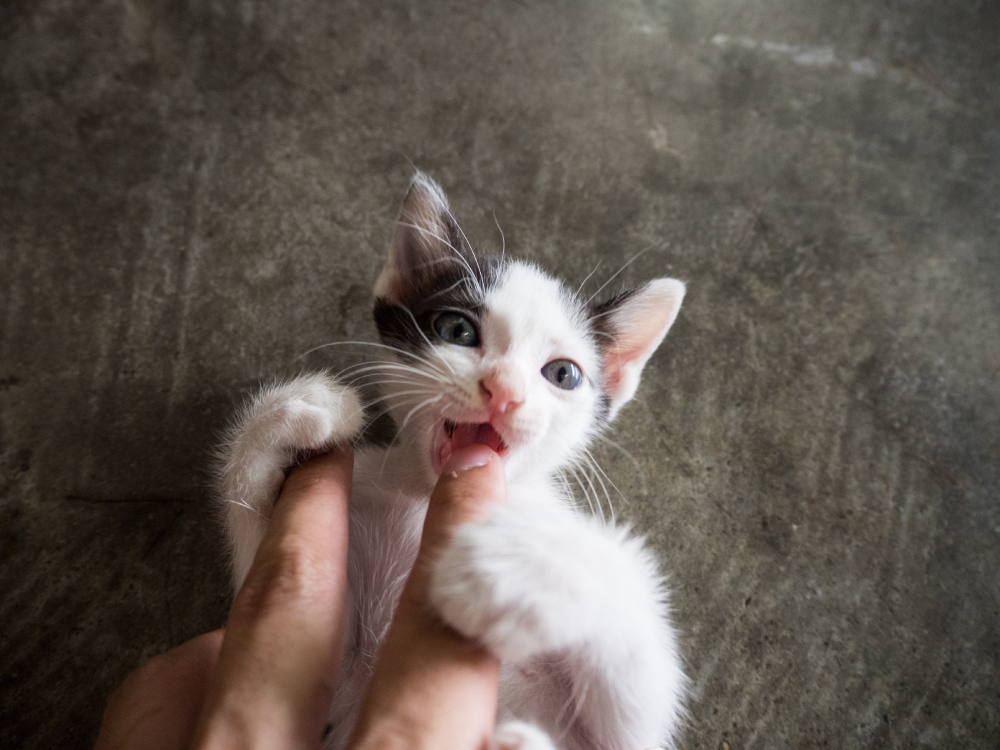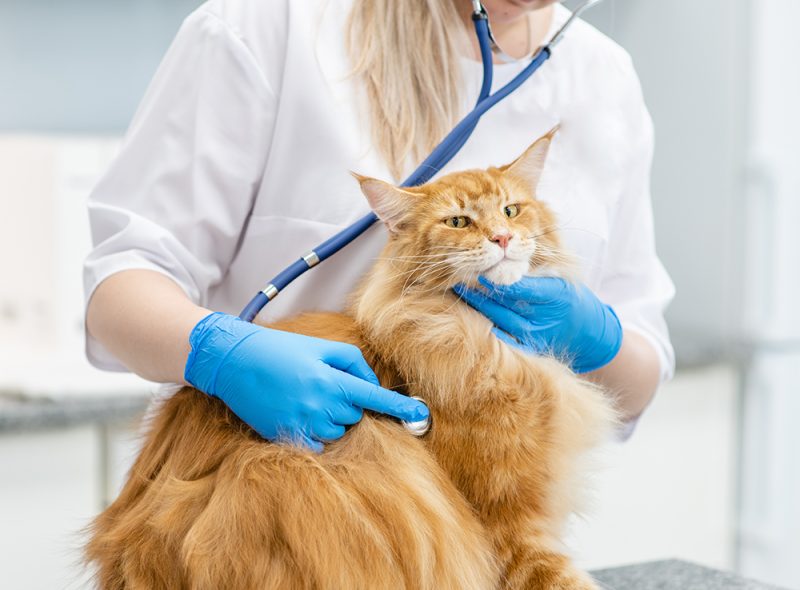Finding kittens in your backyard can be a stress-inducing disruption to the day. For many of us, that would immediately put us into hero mode, jumping into action like we’re their sole hope for survival. But surprisingly, taking control of the situation isn’t always the best option.
Kittens depend on us for help in some cases, but in others, watching and waiting will give them a better chance of growing up happy and healthy. Finding that line can get a little confusing. If you’re uncertain about what to do when you find kittens in your backyard, we have you covered with this straightforward step-by-step guide.

Here’s What to Do
It can be difficult not to view stray kittens as animals in need, but that isn’t always the case. Community cats are savvy survivors and often thrive in their outdoor realm. If the mom is capable, healthy, and present, you don’t have to do anything. The only times you should take in unweaned kittens are listed here:
- The environment is dangerous (e.g., extreme weather, predators)
- The kittens are sick or injured
- The mother is ill, injured, or not around
Keeping that in mind, you can always take steps to support kittens you find in your backyard.
1. Make Sure the Mother Is Around
When you find kittens in your backyard, wait and monitor them from a distance. Watch for the mother and see how she and the kittens behave to ensure she’s healthy. It may take several hours for her to return, or she might be close but hiding because she senses you nearby.
Check on the kittens every few hours if you don’t see their mother. If they’re clean, well-fed, and sleeping quietly, their mother is likely around. To be sure, you can sprinkle flour around the nest and see if the mother tracks dusty paw prints as she comes and goes.
You do not need to intervene if the mother and her young appear healthy. The mother is the best caregiver the kittens can have.
2. Talk to Neighbors

Finding kittens in your yard doesn’t necessarily mean their mom is a community cat. Though unlikely, she could belong to someone and only be using your yard as an out-of-the-way nesting spot. You can talk to your neighbors to see if you can locate the owner or anyone already caring for her.
3. Assess the Kittens’ Ages
The first 2–7 weeks of a kitten’s life are crucial for physical and social development. You should not remove them from their mother’s care if she is present and capable during this time. Kittens need the nutrients in her milk to stay healthy, and their interactions with her and the rest of the litter will help them develop essential social skills.
The following is a quick look at how kittens change during the first 8 weeks to help you identify whether they are ready:
- 1 Day: Kittens can’t stand; ears are folded; eyes are closed
- 1 Week: Kittens stay close in the nest; eyes are almost open; ears are unfolding
- 2 Weeks: Kittens may be walking but wobbly; they’re responding to sounds and smells; eyes are open and blue
- 4 Weeks: Kittens develop finer motor skills: they explore away from their mother; their canines emerge
- 6 Weeks: Kittens climb, pounce, and run; they are cleaning themselves; all baby teeth have appeared
- 8 Weeks: Kittens have almost fully developed their coordination skills; they are weaning from their mother
4. Provide Support for the Mother

If the outdoor area is safe, the mother is present and healthy, and the kittens are all under 8 weeks old, your job is simple; leave them alone. At most, you can move the kittens to a different location if their current position is unsafe. If you do, stay close to the original spot to ensure the mother can easily find them.
Beyond that, you can support the cats remotely. Build or buy a warm, dry, secure shelter, and provide food and water. Keep the feeding dishes away from the shelter and replace them frequently to keep pests out. Monitor them from a safe distance and stay out of view, as you can easily spook the kittens and their mother away if they spot you.
5. Spay and Neuter Kittens Over 8 Weeks Old
Once the kittens reach 8 weeks old, you can trap them to spay and neuter them. Contact your local shelters for information on low-cost spay and neuter options. Spaying and neutering the kittens (and, ideally, their feral mother) will prevent more kittens from appearing and stretching the community’s resources.
How Do I Trap a Kitten?
Trapping kittens and their mother requires a humane trap. You can buy them, or local shelters may have them to rent. Before you trap the kittens, contact your spay-and-neuter service to ensure you can get them in immediately after trapping.
Try to use one trap per kitten. Cover the trap to make it look more secure, and line the bottom with newspaper to protect the kitten’s feet. Coax the kittens with their normal food. Start with food outside the cage, and gradually move it in over the next 2–3 days until it’s at the back of the trap.
Feed them at the same time daily, ideally around early morning or evening. Eventually, the cats will become comfortable with the routine. Avoid leaving food out or traps set overnight or unattended. You’ll want to cover and remove the trap immediately once you capture a kitten to ensure their safety.
6. Decide If You Want to Keep Them

When the kittens are weaned, you can foster/adopt or return them outside after spaying and neutering. What you choose to do with the kittens depends on a number of factors, including how friendly or frightened they appear, and the age at which you find them. Many recommend not adopting until the kittens are 12–14 weeks, as they still benefit significantly from socializing with their litter and mother. At the same time, you shouldn’t wait too long to trap them if you plan to foster or adopt them.
Socializing cats for human interaction becomes much more time-consuming after the initial weaning period, so prepare for plenty of one-on-one time and hesitation from your new pet if you adopt.
Trap-neuter-release (TNR) is often the best option for cats over 16 weeks old. You can sometimes socialize cats and help them adapt to indoor family life when they are roughly 4–8 months old, but it primarily depends on the kitten’s personality and can be more difficult.
Returning Kittens Outside
There’s nothing wrong with returning a kitten outdoors if they were born and raised there. Spaying and neutering are still vital, as is ear tipping to indicate the cat’s altered status. When doing TNR, local shelters usually offer low-cost or free services. They also provide vaccinations to give the cats their best shot at survival.

What to Do If the Mother Isn’t Around
When there’s no sign the mother is around, it’s time to intervene to protect the kittens, no matter their age. Carefully move them indoors to a warm place, ideally using a heating pad to maintain their body temperature of 100°F–103°F. Only feed them a kitten milk replacement, not cow’s milk. Contact your veterinarian immediately if the kittens are sick, malnourished, or injured.
If you need to speak with a vet but can't get to one, head over to PangoVet. It's an online service where you can talk to a vet online and get the advice you need for your pet — all at an affordable price!
Prepare for a challenging few weeks. In their early stages, kittens require numerous supplies, constant attention, and considerable help with tasks like feeding, grooming, and eliminating.
Should I Take Them to a Shelter?
Although fostering kittens under 8 weeks takes work, bringing them to a shelter or rescue could be a worse option. Some may have space for newborns, but most don’t have the resources to give the round-the-clock care young kittens demand.
However, shelters and rescue groups can provide information and supplies to foster kittens. Local organizations can also tie you into their foster programs and networks, giving you more options to find a home.
Can I Return Hand-Raised Kittens Outdoors?
Do not return hand-raised kittens outside. Those who missed the crucial socialization period at 2–7 weeks are ill-prepared for life as community cats.
Take them in or look for someone to foster or adopt them. Contact friends and family for help, look for volunteers, and share their photos on social media. For further assistance, call your nearest shelter or animal advocacy group.

Final Thoughts
Finding kittens in your backyard often requires action, but taking them in isn’t always the most practical move. For community cats, the best option is usually to let the mom do her job. Monitor the kittens, support the nest from afar, and spay and neuter them when they’re of age. Hopefully, this will be the last litter you stumble across in your backyard.
Featured Image Credit: Jaroslaw Kurek, Shutterstock























2 Responses
Seems to me her human family was in the neighborhood but then probably moved away leaving her behind and she adopted me. Has been hanging around my back patio for about 4 weeks and finally 9.9.25 gave birth 4 tiny little kittens. I have increased her food and have not approached the tiny babies (will not do so for some time).
I am not a cat person and this animal has decided to trust me– (I will do my best by her)
Any advice will be very welcome.
Dear Mr. Ramesh,
Thank you for your kindness in helping this cat. Be warned, this is precisely how many individuals become devoted cat owners! Typically, queen cats are capable of caring for their kittens independently. As long as you are providing food and she has shelter, they should be fine.
The most important advice we can offer next is to contact animal services or a Trap-Neuter-Return (TNR) program. Female cats are incredibly prolific, and without spaying, you could potentially see several litters annually.
Here are some resources you might find helpful:
How Many Kittens Can a Cat Have?: https://www.catster.com/cat-health-care/how-many-kittens-can-a-cat-have/
At What Age Should You Neuter or Spay Your Cat?: https://www.catster.com/cat-health-care/at-what-age-should-you-neuter-or-spay-your-cat/
TrapKing Humane Cat Solutions Story: https://www.catster.com/felines-weekly/trapking-humane-cat-solutions-story/
Are TNR Programs for Feral Cats Ethical?: https://www.catster.com/cat-health-care/are-tnr-programs-for-feral-cats-ethical/